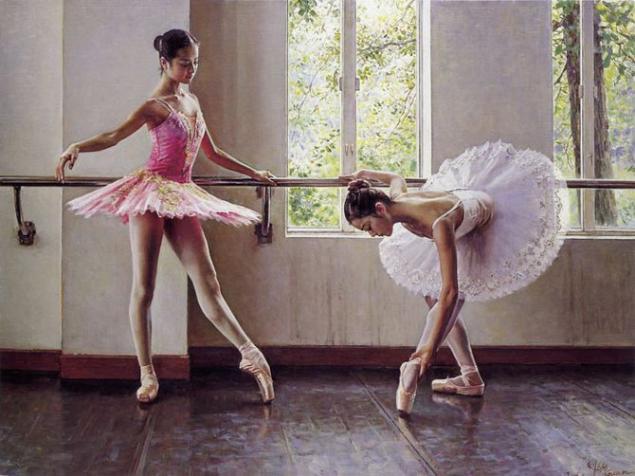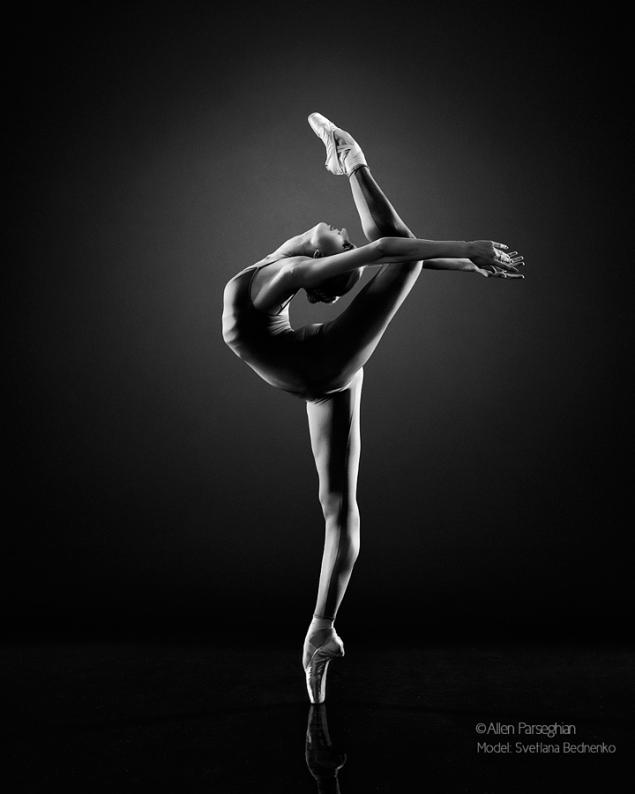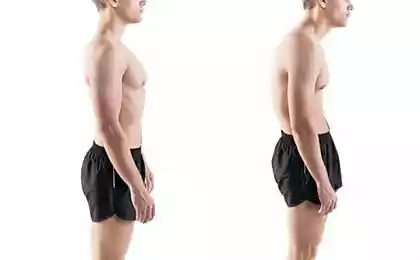675
Posture is not pumped up! 7 errors on the way to a healthy posture
About posture, there are many myths. On the one hand, good posture - it is certainly important, but only whether the force will cause? Sometimes there are different correct posture? Only if the posture blame that back pain? I will answer a few myths.

7 errors on the way to a healthy posture
1. Hold the posture at will - this is a very bad idea.
2. Posture - it is not just a pose.
3. Good posture - a dynamic, changeable posture.
4. The reason for this poor ergonomics, not the posture.
5. The reason for this inactivity, but not in posture.
6. Do not focus on posture.
7. posture is not pumped up.

1. Hold the posture willpower - it's a bad idea
. Forcing yourself "right" to sit or stand - so useless and ineffective exercise that I generally would not mention it ... if not for the fact that it is the most popular way to posture correction
. This is what the majority of people umolchaniyu.Kogda someone decides that "it is time to do all the same posture", he usually is not a comprehensive plan for how he is going to do it. In most cases, "do posture" boils down to an attempt to keep straight, straining his will and attention until the moment comes once the failure of morality and discipline fall.
Assume that the posture can be an act of will - is the same as that to remind myself to breathe. This can be done, but only a very limited period of time. Features of the prefrontal cortex, which is responsible for conscious thought, decision-making and conscious suppression of instinctual impulses are limited.
It can not do everything at once. The man who is constantly willed monitors your posture, spends a limited resource of the prefrontal cortex. Imagine that you need to do everything that you normally do during the day, but in addition, you are driving a car on the busy highway.
Or constantly repeat to myself that was promised at the end of the working day to call a distant relative (that you generally care about, but forget about it would be wrong - with the maintenance of posture is the same garbage), and do not forget, do not forget, that is not zabyt.Tak care of themselves and literally did not hammer head nonsense such as "pull yourself together, rag, and remember always about your posture."
Posture - the result of spinal reflexes and some final adjustment, which is responsible for the brain. This is what works (and should work!) Without the aid of a permanent conscious control.
Yes, you can at any time when you want to, to some extent, change the way you stand, sit and move. But as soon as you are distracted on something else - at the same moment the body will return to its previous unconscious pattern. Consciousness - only a thin layer of foam on the surface of the whole of what the brain
. If you are disciplined enough, maybe you'll have to maintain the desired posture long enough to unconscious behavior began to change after the conscious and the new posture became a habit. But this discipline can have side effects for most people is not desirable. Posture, which is formed by an iron will, as a rule, is hard and slow-moving and looks artificial - in real life it is like a caricature, an unsuccessful imitation of good posture.
2. Posture - it is not just a pose
. It is quite obvious that the posture is influenced by mood and other social and emotional factors. But few people realize that it works both ways: posture can the "power" (confident) posture increases testosterone levels, reduces the levels of cortisol and increases the willingness to take risks, as if you did have more power. By adopting simple postures and 2 spent in each of them 1 minute, a person can feel the power and immediately become more self-confident (proven).
And that is not all. If the posture changing emotions, it is not surprising that it can also change the pain chuvstvitelnost.Tak here's a simple scientific life hacking: straighten shoulders and lift your eyes! This will ease your pain. To a certain degree. Postural pattern can be problematic in the emotional sense. He can both reflect the psychological problems, and to serve their cause or exacerbate them. Habitual posture can "restrict the view," to keep you in a negative state soznaniya.Vazhnost posture for the emotional state and pain sensitivity - perhaps the most compelling reason to try to change the posture.
Posture - it is more than just the sum of all these factors, more than a set of leveling and stabilizing reflexes - it's your life style, your form of flexible "container," the physical manifestation of your comfort zone. We routinely take positions and make movements that meet (or do not contradict) the social and emotional needs of: body express submission or power, happiness and sadness, courage and fear, apathy or discipline. Challenges and implications of posture changes do not lie in only one of the musculoskeletal system, and work in this area can have a profound personal significance.
Posture - is the physical embodiment of your comfort zone. In the worst case, it may feel like a cage. We routinely take positions and make movements that meet (or do not contradict) the social and emotional needs of: body express submission or power, happiness and sadness, courage and fear, apathy or discipline. Challenges and implications of posture changes do not lie in only one of the musculoskeletal system, and work in this area can have a profound personal significance. As a rule, patterns and behaviors that lead to, quite resistant problems.
3. Good posture - a dynamic, changeable posture
. Posture - it is not certain posture, and dynamic pattern of reflexes, habits and adaptation responses to factors that oppose the fact that you were in a more or less upright, and musculoskeletal system to function optimally
. Good posture - mobile, dynamic posture. Good posture - so well run, live, constantly adapt to your activity microchanges muscle tone. A frozen, non-adaptive posture = stiffness and bol.Esli operation willpower - the worst way to correct posture, then a large number of varied physical activity - perhaps the best. This is not only very effective, but also useful in general for many other reasons.
4. The reason for this poor ergonomics, not the posture.
Many of the challenges that lead to excess voltage, can be easily removed if you see the problem. However, people often wonder they do not see. It may not feel discomfort until it's too late, or do not have the correct information about ergonomike.Byvayut cases when pain and suffering come to an end after making small changes to the ergonomics of the workplace
5. The reason for this inactivity, and not in the posture.
In discussions about proper workplace generally overlooked the fact that a long time spent in the chair - is inherently a bad idea, no matter how wonderful any chair. A sedentary lifestyle significantly contributes to the degeneration of postural reflexes.
It opened NASA scientists studying the physiological effects of inactivity. "Use or lose it" - a natural biological lesson: organisms adapt quickly to stimuli and stressors, and the lack of them leads to atrophy. So, perhaps, the simplest means to spur the "weakened" postural reflexes - longer use his body. Not in any particular way, but in general.
Although it makes sense to choose the activities that contribute to the maintenance of posture (and you, of course, can do so. See the next section), the fact is that not even doing especially your posture, you can do what you like, and get a good result. Salsa dancing, swimming, playing golf - whatever you want. For example, the rowing force you to use the upper half of your body is not the way you used to.
Most people are extremely sedentary lifestyle, and their physical activity, and if is there, then the awful monotone: even people whose work is connected with the movement, usually move in some certain way, they do not have diversity. More traffic - or rather, not any particular, namely the different movements - a sure bet, and the first step to good posture
. A variety of postural behavior will also help to find a balance between the path of least resistance and by pressure and exhausting effort between laziness and excessive zeal. Not too far away from my comfort zone, but do not fold it up.

6. Do not focus on posture.
Fixation on his allegedly improper posture can trigger nocebo effect - it's like a placebo, only in reverse. Because of the belief that with you that something is wrong, as well as vulnerability and fragility of the human body, you start to feel pain and a desire to correct your posture. Many experts frighten patients improper posture and overly inflate its value.
The correlation between postural pattern and pain, in general, it only means that they have some relation to each drugu.Obo all this is important to say, because the posture too often diverts the attention of specialists from the real causes of pain. There is a great temptation to say, "Loin pain, because a large deflection" - and leave it at that and stop looking. Yes, quite often bad posture too often diverts the attention of specialists from the real causes of back pain.
7. posture is not pumped up.
People often think that to correct posture is necessary to strengthen weak muscles, so that they balanced the strong. Usually they talk about "strengthening the back muscles." All muscles have a basic tone. The basic tone is maintained automatically, without the involvement of our consciousness. The basic tone - it is not a force to be muscle furiously tugs at his side bone. This level of reduction (and hence the length), which she sets the nervous system. muscle length (which sets the nervous system), how to look at the moment, our posture. As far as we straightened her shoulders, etc.
If we consciously use the power of the muscles (for example, reduce the blade and pulling at attention), it is not our posture, a transient phenomenon. Posture - that supported itself. That posture and movement pattern, to which you return, as soon as the conscious mind stops "to keep your posture," - this is your real posture. It is dictated by the nervous system, but not muscle strength.
However, there are situations when muscle weakness does lead to poor posture. If the innervation of muscles, for whatever reason, is suffering (for example, can pinch the nerve due to a hernia, the block of intervertebral joints, edema, etc.), the muscle becomes weak - in the sense that it is poorly managed, and due to lack of power it comes degeneration process. And then for her starting to work other muscles, healthy, and posture is rebuilt. But this is not the kind of muscle weakness, which can be corrected going to the gym.
In any case, before the muscle pump, to teach her to relax. Power without relaxation = poor nutrition, because the blood vessels are constantly squeezed, and an increased risk of muscle trigger points (that lead to chronic pain and reflected the constant feeling of "Trapped"). If you can not relax the muscles, which means you do not manage it adequately.
Conclusion.
If you want to improve your posture simply out of principle, I would not recommend you do it. It's not worth the effort. You do not need to be taken for it. There are hundreds of ways to spend your time more usefully, pravda.Vam may not like the result of your efforts. Bad postural habit - not quite the same thing as a harmful addiction. Trying to live with better posture can give you more problems and be less comfortable than the state that initially made you change.
For good posture is important to be able to recognize muscle tension, learn to relax the muscles, develop a sense of balance and ease - and only then we can take up the posture.
Author: Andrew Beloveshkin

7 errors on the way to a healthy posture
1. Hold the posture at will - this is a very bad idea.
2. Posture - it is not just a pose.
3. Good posture - a dynamic, changeable posture.
4. The reason for this poor ergonomics, not the posture.
5. The reason for this inactivity, but not in posture.
6. Do not focus on posture.
7. posture is not pumped up.

1. Hold the posture willpower - it's a bad idea
. Forcing yourself "right" to sit or stand - so useless and ineffective exercise that I generally would not mention it ... if not for the fact that it is the most popular way to posture correction
. This is what the majority of people umolchaniyu.Kogda someone decides that "it is time to do all the same posture", he usually is not a comprehensive plan for how he is going to do it. In most cases, "do posture" boils down to an attempt to keep straight, straining his will and attention until the moment comes once the failure of morality and discipline fall.
Assume that the posture can be an act of will - is the same as that to remind myself to breathe. This can be done, but only a very limited period of time. Features of the prefrontal cortex, which is responsible for conscious thought, decision-making and conscious suppression of instinctual impulses are limited.
It can not do everything at once. The man who is constantly willed monitors your posture, spends a limited resource of the prefrontal cortex. Imagine that you need to do everything that you normally do during the day, but in addition, you are driving a car on the busy highway.
Or constantly repeat to myself that was promised at the end of the working day to call a distant relative (that you generally care about, but forget about it would be wrong - with the maintenance of posture is the same garbage), and do not forget, do not forget, that is not zabyt.Tak care of themselves and literally did not hammer head nonsense such as "pull yourself together, rag, and remember always about your posture."
Posture - the result of spinal reflexes and some final adjustment, which is responsible for the brain. This is what works (and should work!) Without the aid of a permanent conscious control.
Yes, you can at any time when you want to, to some extent, change the way you stand, sit and move. But as soon as you are distracted on something else - at the same moment the body will return to its previous unconscious pattern. Consciousness - only a thin layer of foam on the surface of the whole of what the brain
. If you are disciplined enough, maybe you'll have to maintain the desired posture long enough to unconscious behavior began to change after the conscious and the new posture became a habit. But this discipline can have side effects for most people is not desirable. Posture, which is formed by an iron will, as a rule, is hard and slow-moving and looks artificial - in real life it is like a caricature, an unsuccessful imitation of good posture.
2. Posture - it is not just a pose
. It is quite obvious that the posture is influenced by mood and other social and emotional factors. But few people realize that it works both ways: posture can the "power" (confident) posture increases testosterone levels, reduces the levels of cortisol and increases the willingness to take risks, as if you did have more power. By adopting simple postures and 2 spent in each of them 1 minute, a person can feel the power and immediately become more self-confident (proven).
And that is not all. If the posture changing emotions, it is not surprising that it can also change the pain chuvstvitelnost.Tak here's a simple scientific life hacking: straighten shoulders and lift your eyes! This will ease your pain. To a certain degree. Postural pattern can be problematic in the emotional sense. He can both reflect the psychological problems, and to serve their cause or exacerbate them. Habitual posture can "restrict the view," to keep you in a negative state soznaniya.Vazhnost posture for the emotional state and pain sensitivity - perhaps the most compelling reason to try to change the posture.
Posture - it is more than just the sum of all these factors, more than a set of leveling and stabilizing reflexes - it's your life style, your form of flexible "container," the physical manifestation of your comfort zone. We routinely take positions and make movements that meet (or do not contradict) the social and emotional needs of: body express submission or power, happiness and sadness, courage and fear, apathy or discipline. Challenges and implications of posture changes do not lie in only one of the musculoskeletal system, and work in this area can have a profound personal significance.
Posture - is the physical embodiment of your comfort zone. In the worst case, it may feel like a cage. We routinely take positions and make movements that meet (or do not contradict) the social and emotional needs of: body express submission or power, happiness and sadness, courage and fear, apathy or discipline. Challenges and implications of posture changes do not lie in only one of the musculoskeletal system, and work in this area can have a profound personal significance. As a rule, patterns and behaviors that lead to, quite resistant problems.
3. Good posture - a dynamic, changeable posture
. Posture - it is not certain posture, and dynamic pattern of reflexes, habits and adaptation responses to factors that oppose the fact that you were in a more or less upright, and musculoskeletal system to function optimally
. Good posture - mobile, dynamic posture. Good posture - so well run, live, constantly adapt to your activity microchanges muscle tone. A frozen, non-adaptive posture = stiffness and bol.Esli operation willpower - the worst way to correct posture, then a large number of varied physical activity - perhaps the best. This is not only very effective, but also useful in general for many other reasons.
4. The reason for this poor ergonomics, not the posture.
Many of the challenges that lead to excess voltage, can be easily removed if you see the problem. However, people often wonder they do not see. It may not feel discomfort until it's too late, or do not have the correct information about ergonomike.Byvayut cases when pain and suffering come to an end after making small changes to the ergonomics of the workplace
5. The reason for this inactivity, and not in the posture.
In discussions about proper workplace generally overlooked the fact that a long time spent in the chair - is inherently a bad idea, no matter how wonderful any chair. A sedentary lifestyle significantly contributes to the degeneration of postural reflexes.
It opened NASA scientists studying the physiological effects of inactivity. "Use or lose it" - a natural biological lesson: organisms adapt quickly to stimuli and stressors, and the lack of them leads to atrophy. So, perhaps, the simplest means to spur the "weakened" postural reflexes - longer use his body. Not in any particular way, but in general.
Although it makes sense to choose the activities that contribute to the maintenance of posture (and you, of course, can do so. See the next section), the fact is that not even doing especially your posture, you can do what you like, and get a good result. Salsa dancing, swimming, playing golf - whatever you want. For example, the rowing force you to use the upper half of your body is not the way you used to.
Most people are extremely sedentary lifestyle, and their physical activity, and if is there, then the awful monotone: even people whose work is connected with the movement, usually move in some certain way, they do not have diversity. More traffic - or rather, not any particular, namely the different movements - a sure bet, and the first step to good posture
. A variety of postural behavior will also help to find a balance between the path of least resistance and by pressure and exhausting effort between laziness and excessive zeal. Not too far away from my comfort zone, but do not fold it up.

6. Do not focus on posture.
Fixation on his allegedly improper posture can trigger nocebo effect - it's like a placebo, only in reverse. Because of the belief that with you that something is wrong, as well as vulnerability and fragility of the human body, you start to feel pain and a desire to correct your posture. Many experts frighten patients improper posture and overly inflate its value.
The correlation between postural pattern and pain, in general, it only means that they have some relation to each drugu.Obo all this is important to say, because the posture too often diverts the attention of specialists from the real causes of pain. There is a great temptation to say, "Loin pain, because a large deflection" - and leave it at that and stop looking. Yes, quite often bad posture too often diverts the attention of specialists from the real causes of back pain.
7. posture is not pumped up.
People often think that to correct posture is necessary to strengthen weak muscles, so that they balanced the strong. Usually they talk about "strengthening the back muscles." All muscles have a basic tone. The basic tone is maintained automatically, without the involvement of our consciousness. The basic tone - it is not a force to be muscle furiously tugs at his side bone. This level of reduction (and hence the length), which she sets the nervous system. muscle length (which sets the nervous system), how to look at the moment, our posture. As far as we straightened her shoulders, etc.
If we consciously use the power of the muscles (for example, reduce the blade and pulling at attention), it is not our posture, a transient phenomenon. Posture - that supported itself. That posture and movement pattern, to which you return, as soon as the conscious mind stops "to keep your posture," - this is your real posture. It is dictated by the nervous system, but not muscle strength.
However, there are situations when muscle weakness does lead to poor posture. If the innervation of muscles, for whatever reason, is suffering (for example, can pinch the nerve due to a hernia, the block of intervertebral joints, edema, etc.), the muscle becomes weak - in the sense that it is poorly managed, and due to lack of power it comes degeneration process. And then for her starting to work other muscles, healthy, and posture is rebuilt. But this is not the kind of muscle weakness, which can be corrected going to the gym.
In any case, before the muscle pump, to teach her to relax. Power without relaxation = poor nutrition, because the blood vessels are constantly squeezed, and an increased risk of muscle trigger points (that lead to chronic pain and reflected the constant feeling of "Trapped"). If you can not relax the muscles, which means you do not manage it adequately.
Conclusion.
If you want to improve your posture simply out of principle, I would not recommend you do it. It's not worth the effort. You do not need to be taken for it. There are hundreds of ways to spend your time more usefully, pravda.Vam may not like the result of your efforts. Bad postural habit - not quite the same thing as a harmful addiction. Trying to live with better posture can give you more problems and be less comfortable than the state that initially made you change.
For good posture is important to be able to recognize muscle tension, learn to relax the muscles, develop a sense of balance and ease - and only then we can take up the posture.
Author: Andrew Beloveshkin
Rubbing salt - a simple and effective procedure for the health of the body
Plate Balance Jamie Oliver, who energize you for the day























